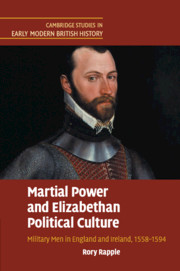Book contents
- Frontmatter
- Contents
- Acknowledgements
- List of abbreviations
- Notes on the text
- Political map of sixteenth-century Ireland circa 1534
- CAMBRIDGE STUDIES IN EARLY MODERN BRITISH HISTORY
- Introduction
- 1 Chimneys in summer
- 2 Martial men and their discontents
- 3 The limits of allegiance: English martial men, Europe and the Elizabethan regime
- 4 The captains and the Irish context
- 5 The limits of imperium: martial men and government
- 6 The limits of rhetoric: the captains and violence in Elizabethan Ireland to 1588
- 7 Unlimited indemnity: delegates versus viceroys
- Conclusion
- Bibliography
- Index
3 - The limits of allegiance: English martial men, Europe and the Elizabethan regime
Published online by Cambridge University Press: 02 July 2009
- Frontmatter
- Contents
- Acknowledgements
- List of abbreviations
- Notes on the text
- Political map of sixteenth-century Ireland circa 1534
- CAMBRIDGE STUDIES IN EARLY MODERN BRITISH HISTORY
- Introduction
- 1 Chimneys in summer
- 2 Martial men and their discontents
- 3 The limits of allegiance: English martial men, Europe and the Elizabethan regime
- 4 The captains and the Irish context
- 5 The limits of imperium: martial men and government
- 6 The limits of rhetoric: the captains and violence in Elizabethan Ireland to 1588
- 7 Unlimited indemnity: delegates versus viceroys
- Conclusion
- Bibliography
- Index
Summary
And sometimes through the greatness of their minds, [those] that gallop after glory, are carried away to seek out new kingdoms, and refuse their old habitation. A matter falling out well, worthy to be liked, but otherwise, a heavy tale to be told.
Churchyardes Choise (1579) sig. miii.When William Flower, Norroy king of arms, arrived incognito at the Abbey of St Remy in Rheims on 7 June 1557 carrying Mary I's declaration of war on France, he was heralding a conflict that would end with shame and defeat for England. On the same day, a proclamation displayed throughout London enjoined all Englishmen to regard ‘the French King, and his vassals as public enemies … and to harm them wherever possible’. Whatever this shift in foreign policy portended for the citizens of London, it held immediate significance for Nicholas and John Malby, both of whom at that time were soldiers in Henry II's camp at Cambrai. According to Thomas Churchyard (the source of the tale), the brothers had served with the French against Charles V for nine years. Despite this, the Malbys, heeding Mary's commandment, immediately defected to the imperial forces. This volte-face and the cursory way in which Churchyard deals with it beg a number of questions.
- Type
- Chapter
- Information
- Martial Power and Elizabethan Political CultureMilitary Men in England and Ireland, 1558–1594, pp. 86 - 126Publisher: Cambridge University PressPrint publication year: 2009

